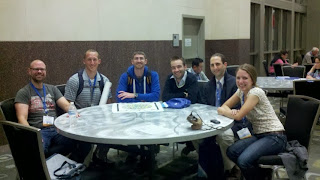Keep updated with the Ohio Hops Project: "Like" us on facebook!
https://www.facebook.com/OhioHops
Friday, November 29, 2013
Monday, November 25, 2013
ALE update
With ESA behind us the ALE Lab is getting back into the groove. We have are very busy around here!
HAVE A HAPPY AND SAFE THANKSGIVING!
- Nicole is working hard on the Cleveland project, getting the plantings arranged, making maps, and organizing educational materials.
- Chelsea is planning a hops workshop for February, and might be visiting the local brewery every now then for "research"
- Scott is preparing for his departmental seminar, an important step for his transition from the Master's program to the Doctorate program (good luck Scott!)
- Andrea is identifying 100's (or 1000's??) of flies...and probably drinking large quantities of Mountain Dew.
- Mary of course is busy advising/helping us with everything above as well various other projects!
 |
| Members of the ALE lab enjoying some beverages at ESA. Nicole isn't pictured, but she'll be there next year! |
HAVE A HAPPY AND SAFE THANKSGIVING!
Friday, November 22, 2013
Misunderstood spider...
Here at the ALE lab we are very interested in spiders! They are generalist predators which means: they eat many different things, especially agricultural and house hold pests! Since they hunt a variety of pests we consider them to be important biological control agents, meaning they eat pests for us so we don't have have to use as many insecticides.
Spiders may be among the most misunderstood of arthropods. Most people have heard about the brown recluse to be dangerous, however much of that information is misleading. For starters...the range of the brown recluse just barely reaches the South-western tip of Ohio, so Ohioans should not fear!
Wired.com recently published an article regarding the poor misunderstood brown recluse..check it out!
LINK: Why You Need Not Fear the Poor, Misunderstood Brown Recluse Spider
Also...let's not forget, jumping spiders are just adorable.
Spiders may be among the most misunderstood of arthropods. Most people have heard about the brown recluse to be dangerous, however much of that information is misleading. For starters...the range of the brown recluse just barely reaches the South-western tip of Ohio, so Ohioans should not fear!
 |
| Wikipedia |
LINK: Why You Need Not Fear the Poor, Misunderstood Brown Recluse Spider
Also...let's not forget, jumping spiders are just adorable.
Thursday, November 21, 2013
ESA presentations by the ALE lab
The ALE lab was well represented at ESA this year with three talks and two posters!
Talks:
Talks:
- Pollinator diversity and pollination services provided to urban garden and turf-based vacant lot habitats - Scott
- Can change in urban population size represent an opportunity to enhance predator biodiversity and biocontrol services in shrinking cities? - Mary
- How are lady beetle communities shaped by patch and landscape composition? - Chelsea
Posters:
- Using the Environmental Impact Quotient (EIQ) to quantify the impact of pesticide use on natural enemy guilds in organic and conventionally-managed agroecosystems - Andrea
Friday, November 15, 2013
The entomologists escaped from the Austin conference center...
...to capture insects of course!
This year a couple students and I managed to find our way to a green-space on the banks of the Colorado river. There were plenty of insects populating this urban area!
We found two wild honey bee hives. Sorry...didn't take any pictures, we just avoided them. We were not very interested in finding out if the bees were aggressive or not, although it is probably safe to say they were not aggressive since it took us awhile to notice them.
There was a nice population of thread waisted wasps (not sure what species yet, Andrea might be able to figure that out later since she collected some!).
Found only one lady beetle, and of course it was a multi-colored Asian (Harmonia axyridis) just the most common invasive lady beetle you can find around Ohio. Good thing I flew to Texas to see one!
...the spotted cucumber beetle (Diabrotica undecimpunctata)!
Andrea also spotted a butterfly i the distance, and started the chase!
It escaped.
Andrea and Erin brought back a good number of specimens. If they are able to identify any interesting Austin based insects we'll report it here!
Dummy caterpillar experiment results!
I checked on our dummy caterpillars over the weekend and saw no action so I decided it would be best to leave them for a week to give ample time for some predation. I probably should have checked the weather before making that decision...several inches of snow later.....I collected what was left of the caterpillars this afternoon. Two sets (six caterpillars total) were on plants that died and though I tried, I could not find the caterpillars! Of the two other sets I did find, there were two caterpillars that had interesting marks. First I referenced what some common predation marks might look like:
Then I looked at our caterpillars under the scope:
What do you guys think? Both of these caterpillars had been secured to branches of a pine tree. I'm guessing this experiment would be a lot more interesting if it was done in the spring!
 |
| Howe et al., 2009 |
 | |||
| Curtis et al., 2013 |
 |
| Mark found on the dorsal aspect (top) of the caterpillar. |
 | |||
| Mark found on the lateral aspect (side) of the caterpillar. |
Monday, November 11, 2013
ESA: Day 1
The ALE lab arrived safely at ESA!!
Here we are hanging out with some other OSU entomologists before the opening reception.
Here we are hanging out with some other OSU entomologists before the opening reception.
Friday, November 8, 2013
Dummy Caterpillar Testing
As part of our vacant lot study being conducted in Cleveland, we are doing an outreach program targeting high school students in which we hope to introduce the students to natural predators through a "dummy caterpillar" experiment. There is a bit more to the program than just the experiment but the fun part for us is that we get to test out the experiment before preparing the teaching materials that will be used for the outreach program. If you can't find the caterpillars, you can click the photo for a larger image.
I'll be checking the caterpillars over the weekend to look for signs of predation and will collect them all on Monday. We'll check them out under the microscope and try to identify any marks (if present). We'll keep you posted as to how the mini-experiment goes so check back for more information.
 | ||
| Our "caterpillars". We made three different shades of green by combining green, white and brown plasticine. |
I'll be checking the caterpillars over the weekend to look for signs of predation and will collect them all on Monday. We'll check them out under the microscope and try to identify any marks (if present). We'll keep you posted as to how the mini-experiment goes so check back for more information.
Tuesday, November 5, 2013
Scott wins travel award!
The Ohio State University Entomology department held it's DeLong award competition yesterday. This competition takes place every year before our national meeting (ESA). It gives the students a chance to practice their presentations for ESA, and provides travel money to the winners.
Today we found out that an ALE lab graduate student, Scott Prajzner, won one of the two awards! The other award went to Travis Calkins.
Congratulations Scott and Travis!!
Subscribe to:
Comments (Atom)

























